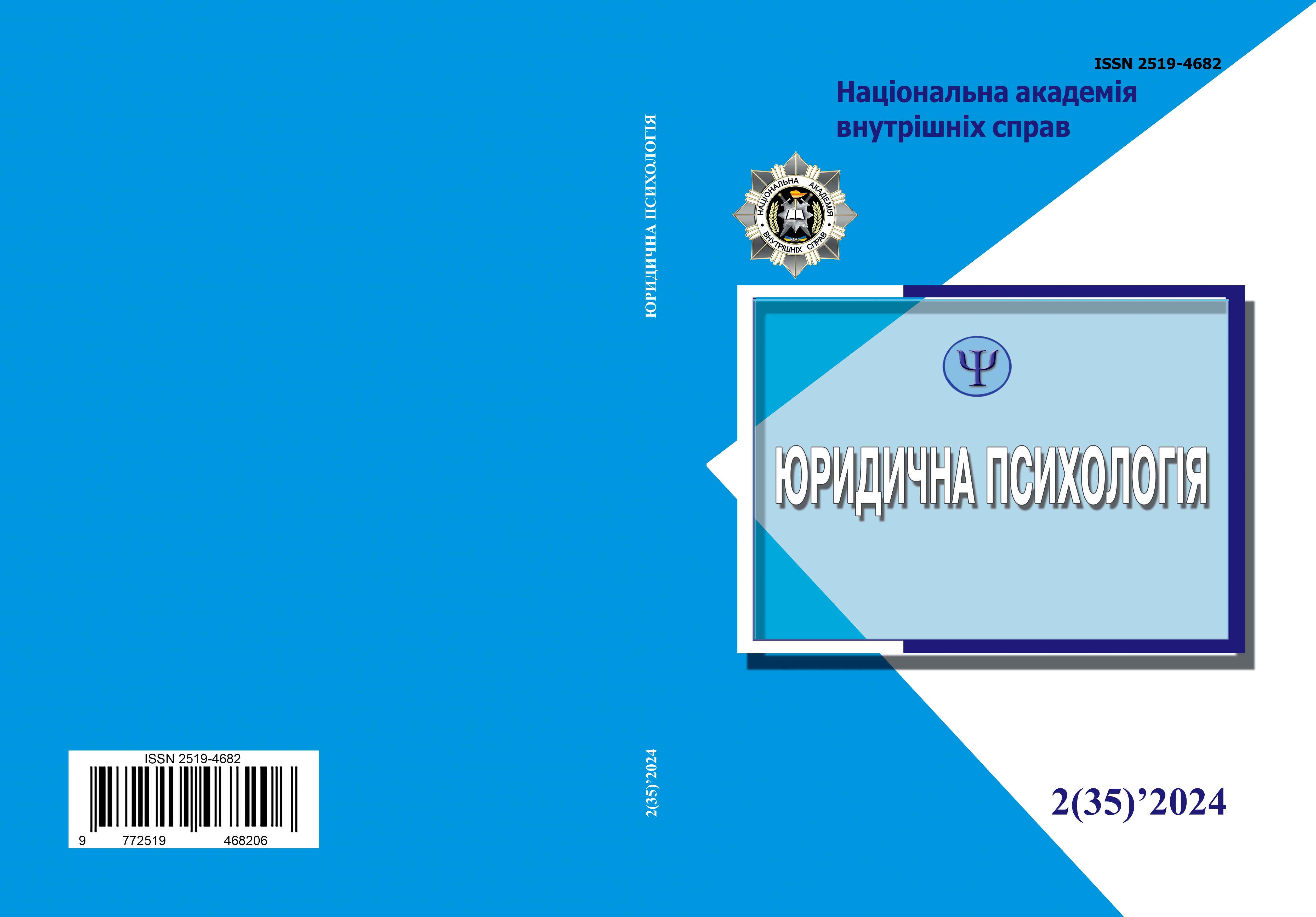International Experience of Psychological Support for Police and Military Personnel before Discharge from Service
Abstract
Abstract. The article presents a comprehensive review of international experience of psychological support for military and law enforcement personnel in the transition to civilian life and retirement. The authors study the practices of the USA, the UK, Canada, Israel, analyzing various programs and methods of psychological support, their effectiveness and adaptability. The study reveals key features of the approaches of different countries. The United States demonstrates the complexity of programs that cover the entire spectrum of needs - from psychological support to employment and financial planning. The study notes the innovativeness of American methods, including the use of virtual reality to treat PTSD. The United Kingdom focuses on early intervention and overcoming stigma around mental health by integrating government and charitable initiatives. The Canadian experience is characterized by interagency cooperation and cultural sensitivity of programs, taking into account the needs of different population groups. Israel offers a proactive approach, taking into account the constant threat to security, starting psychological support during active service and continuing it afterwards. The Israeli model demonstrates the effectiveness of integrating the experience of veterans into work with active military personnel. The article examines the adaptation of international experience to Ukrainian realities, the integration of civilian specialists and volunteers into the psychological support system, and programs to support military families. The authors emphasize the importance of a comprehensive, evidence-based approach to psychological support that takes into account the specific needs of target groups. The need to continuously adapt programs to new challenges, such as the COVID-19 pandemic and changes in the nature of military conflicts, is noted. The article offers valuable practices for improving psychological support systems, especially in countries facing similar challenges. The study may be useful for policy makers, psychologists, social workers, and other professionals involved in working with military personnel, law enforcement officers, and veterans.
Keywords: psychological support; law enforcement officers; military personnel; discharge from service; adaptation to civilian life; preparation for retirement; international experience.
Downloads
References
About the Yellow Ribbon Reintegration. Site "Program Yellow Ribbon Reintegration". Retrieved from https://www.yellowribbon.mil/.
About Us. Site "NATAL". Retrieved from https://www.natal.org.il/en/about-us/.
Blais, A.-R., Sullivan-Kwantes, W., & McCreary, D.R. (2006). Post-deployment reintegration experiences of AF personnel: Implications for scale development: Technical Report Defence R&D Canada. Toronto. Retrieved from https://apps.dtic.mil/sti/pdfs/ADA473007.pdf.
Blue Light Programme. Site "Mind". Retrieved from https://www.mind.org.uk/news-campaigns/campaigns/blue-light-programme/.
Career Transition Partnership. Site "GOV.UK". Retrieved from https://www.gov.uk/guidance/career-transition-partnership.
Richman, M. (2019). Conference to examine health, legal issues involving Veterans and others who break the law. Site "U.S. Department of Veterans Affairs". Retrieved from https://www.research.va.gov/currents/0219-Conference-to-examine-health-legal-issues-involving-Veterans-and-others-who-break-the-law.cfm.
Fabian, E. (2024). Defense Ministry Rehabilitation Department says over 10,000 troops treated since Oct. 7. Site "The Time of Israel". Retrieved from https://www.timesofisrael.com/over-10000-israeli-troops-treated-since-oct-7-says-ministry-rehab-department/.
Donnelly, E., Valentine, C., Oehme, K. (2015). Law Enforcement Officers and Employee Assistance Programs. Policing: An International Journal of Police Strategies & Management, 38(2), 206-220.
Kinnaird, B.A. Life After Law Enforcement. Finding the hidden splendor for our warriors in blue "after the smoke clears". Site "Psychology Today". Retrieved from https://www.psychologytoday.com /us/blog/the-hero-in-you/201507/life-after-law-enforcement.
Kintzle, S., Keeling, M., Xintarianos, E., & Williams, K. (2015). Exploring the economic and employment challenges facing U.S. veterans: A qualitative study of Volunteers of America service providers and veteran clients. Clinical Psychology. Retrieved from https://www.researchgate.net /publication/280238737.
Le, A., Ngnoumen, Ch.T., & Langer, E.J. (2014). The Wiley Blackwell Handbook of Mindfulness (Vol. II). Wiley Blackwell. Retrieved from https://elizabeth-stanley.com/wp-content/uploads/2019/08/ Stanley_2014_Wiley-handbook-of-mindfulness_MMFT-chapter.pdf.
Mental health support for veterans, service leavers and reservists. Site "NHS England". Retrieved from https://www.nhs.uk/nhs-services/armed-forces-community/mental-health/veterans-reservists/.
Operational Stress Injury Social Support (OSISS). Site "Government of Canada". Retrieved from https://www.canada.ca/en/department-national-defence/services/benefits-military/health-support/casualty-support/peer-support/osiss.html.
Prioritize full implementation of the RCMP Employee Well-being Strategy. Site "Royal Canadian Mounted Police". Retrieved from https://www.rcmp-grc.gc.ca/en/change-the-rcmp/support-modern-policing/prioritize-full-implementation-the-rcmp-employee-well-being-strategy.
Ruiz, J., & Morrow, E. (2005). Retiring the Old Centurion: Life after a Career in Policing – An Exploratory Study. International Journal of Public Administration, 28(13-14), 1151-1186. doi: 10.1080/01900690500290686.
Second Career Assistance Network (SCAN). Seminars now available online. Site "Canadian Military Family Magazine". Retrieved from https://www.cmfmag.ca/progs_services/second-career-assistance-network-scan-seminars-now-available-online/.
Solomon, Z., Bachem, R., Levin, Y., Ginzburg, K., & Zerach, G. (2021). Long-term trajectories of posttraumatic stress disorder: Categorical and dimensional perspectives. European Journal of Psychotraumatology, 12(1). doi: 10.1080/00332747.2018.1485369.
Solomon, Z., & Benbenishty, R. (1986). The role of proximity, immediacy, and expectancy in frontline treatment of combat stress reaction among Israelis in the Lebanon War. American Journal of Psychiatry, 143(5), 613-617. doi: 10.1176/ajp.143.5.613.
The Challenges Facing the Department of Veterans Affairs in 2021. (n.d.). Retrieved from https://www.americanprogress.org/article/challenges-facing-department-veterans-affairs-2021/.
The Police Rehabilitation Centre Flint House. A professional HealthCare Provider specialising in the treatment of police officers. Site "Defence Police Federation". Retrieved from https://dpf.org.uk /services/the-police-rehabilitation-centre-flint-house/.
U.S. Department of Defense. Site "DoD Transition Assistance Program". Retrieved from https://dodtap.mil/.
Vet Center Program. Site "U.S. Department of Veterans Affairs". Retrieved from https://www.vetcenter.va.gov/.
Waters, J. A., & Ussery, W. (2007). Police stress: history, contributing factors, symptoms, and interventions. Policing: An International Journal, 30(2), 169-188. doi: 10.1108/13639510710753199.
Abstract views: 168 PDF Downloads: 170
- Authors reserve the right to authorship of their own work and transfer to the magazine the right of the first publication of this work under the terms of the Creative Commons Attribution License, which allows other persons to freely distribute published work with mandatory reference to authors of the original work and the first publication of an article in this magazine.
- Authors have the right to enter into separate additional agreements on non-exclusive dissemination of the work in the form in which it was published in the journal (for example, to post an article in the institution's repository or to publish as part of a monograph), provided that the link to the first publication of the work in this journal is maintained.
- The journal's policy allows and encourages the posting of articles by authors on the Internet (for example, in electronic storehouses of institutions or on personal websites), both before the submission of this manuscript to the editorial office and during its editorial processing, as this contributes to the creation of a productive scientific discussion and positively affects the efficiency and dynamics of citing the published work.




